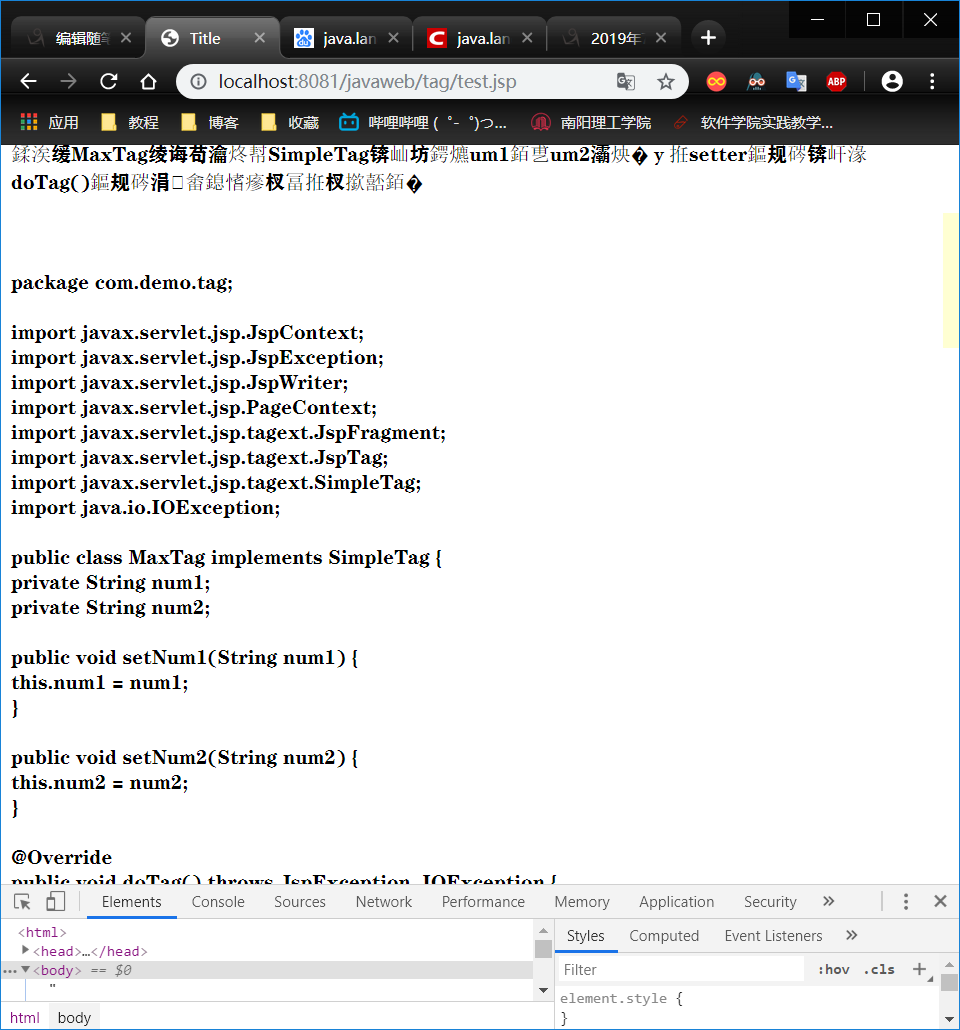练习一:<max:num1="" num2=""/>
<petrelsky:maxTagDemo num1="23" num2="35">
练习二:定制一个带有一个属性的标签<xxx:readFile src="">用于输出指定文件的内容
<petrelsky:readFileTagDemo src="WEB-INF/haha.txt">
练习一:
创建MaxTag类并实现SimpleTag,添加num1、num2属性和setter方法,在doTag()方法中完成比较和输出。
package com.demo.tag;
import javax.servlet.jsp.JspContext;
import javax.servlet.jsp.JspException;
import javax.servlet.jsp.JspWriter;
import javax.servlet.jsp.PageContext;
import javax.servlet.jsp.tagext.JspFragment;
import javax.servlet.jsp.tagext.JspTag;
import javax.servlet.jsp.tagext.SimpleTag;
import java.io.IOException;
public class MaxTag implements SimpleTag {
private String num1;
private String num2;
public void setNum1(String num1) {
this.num1 = num1;
}
public void setNum2(String num2) {
this.num2 = num2;
}
@Override
public void doTag() throws JspException, IOException {
int a = 0;
int b = 0;
JspWriter out = pageContext.getOut();
try {
a = Integer.parseInt(num1);
b = Integer.parseInt(num2);
out.print(a > b ? a : b);
}catch (Exception e){
out.print("输入的属性格式不正确!!!");
}
}
@Override
public void setParent(JspTag jspTag) {
}
@Override
public JspTag getParent() {
return null;
}
private PageContext pageContext;
@Override
public void setJspContext(JspContext jspContext) {
this.pageContext = (PageContext) jspContext;
}
@Override
public void setJspBody(JspFragment jspFragment) {
}
}
在mytld.tld中进行标签的相关配置
<tag>
<name>max</name>
<tag-class>com.demo.tag.MaxTag</tag-class>
<body-content>empty</body-content>
<attribute>
<name>num1</name>
<required>true</required>
<rtexprvalue>true</rtexprvalue>
</attribute>
<attribute>
<name>num2</name>
<required>true</required>
<rtexprvalue>true</rtexprvalue>
</attribute>
</tag>
在jsp页面引用标签,首先需要导入标签
<%@taglib prefix="yhs" uri="http://mycompany.com" %>
<yhs:max num1="${param.a}" num2="${param.b}"></yhs:max>
效果图:


通常情况下开发简单标签直接继承SimpleTagSupport就可以了,可以直接调用其对应的getter方法的到 对应API
public class SimpleTagSupport implements SimpleTag {
private JspTag parentTag;
private JspContext jspContext;
private JspFragment jspBody;
public void doTag() throws JspException, IOException {
}
public void setParent(JspTag parent) {
this.parentTag = parent;
}
public JspTag getParent() {
return this.parentTag;
}
public void setJspContext(JspContext pc) {
this.jspContext = pc;
}
protected JspContext getJspContext() {
return this.jspContext;
}
public void setJspBody(JspFragment jspBody) {
this.jspBody = jspBody;
}
protected JspFragment getJspBody() {
return this.jspBody;
}
}
练习二:
创建ReadFileTag类继承SimpleTagSupport类,重写doTag()方法,添加src属性
package com.demo.tag;
import javax.servlet.jsp.JspException;
import javax.servlet.jsp.PageContext;
import javax.servlet.jsp.tagext.SimpleTagSupport;
import java.io.BufferedReader;
import java.io.IOException;
import java.io.InputStream;
import java.io.InputStreamReader;
public class ReadFileTag extends SimpleTagSupport {
//相对于当前web应用的根路径额文件名
private String src;
public void setSrc(String src) {
this.src = src;
}
@Override
public void doTag() throws JspException, IOException {
PageContext pageContext = (PageContext) getJspContext();
InputStream is = pageContext.getServletContext().getResourceAsStream(src);
BufferedReader reader = new BufferedReader(new InputStreamReader(is));
String str = null;
while ((str = reader.readLine())!=null){
pageContext.getOut().write(str);
pageContext.getOut().write("<br>");
}
}
}
在读取时标签必须转换为特定的编码符号
str = Pattern.compile("<").matcher(str).replaceAll("<");
str = Pattern.compile(">").matcher(str).replaceAll(">");
在mytld.tld中进行标签的相关配置
<tag>
<name>readfile</name>
<tag-class>com.demo.tag.ReadFileTag</tag-class>
<body-content>empty</body-content>
<attribute>
<name>src</name>
<required>true</required>
<rtexprvalue>true</rtexprvalue>
</attribute>
</tag>
在jsp页面引用标签,首先需要导入标签
<%@taglib prefix="yhs" uri="http://mycompany.com" %>
<yhs:readfile src="/WEB-INF/note.txt"></yhs:readfile>
效果图:
